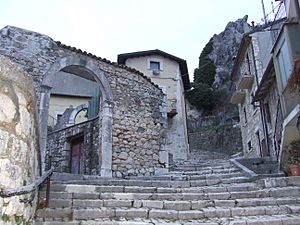Battle of Castel di Sangro facts for kids
Quick facts for kids Battle of Castel di Sangro |
|||||||
|---|---|---|---|---|---|---|---|
| Part of the Neapolitan War | |||||||
 Castel di Sangro - scorcio del centro storico |
|||||||
|
|||||||
| Belligerents | |||||||
| Commanders and leaders | |||||||
| Strength | |||||||
| 1,000 infantry 1,000 cavalry |
2,000 infantry | ||||||
| Casualties and losses | |||||||
| 15 killed or wounded | 400 killed or wounded 206 captured |
||||||
The Battle of Castel di Sangro was a small but important fight during the Neapolitan War. It happened on May 13, 1815, in a town called Castel di Sangro in central Italy. In this battle, the Neapolitan army was completely defeated by the Austrian forces.
Contents
Understanding the Neapolitan War
The Neapolitan War was a short conflict in 1815. It was fought between the Kingdom of Naples and the Austrian Empire. The King of Naples, Joachim Murat, wanted to unite Italy. He declared war on Austria. This war was part of the bigger changes happening in Europe after Napoleon Bonaparte's time.
The Battle of Tolentino
Before Castel di Sangro, there was a much bigger battle. This was the Battle of Tolentino. King Joachim Murat and his main Neapolitan army fought the Austrians there. The Neapolitan army lost this battle. This defeat was a major setback for Murat.
Retreating from Tolentino
After losing at Tolentino, the Neapolitan army began to retreat. They were moving south to try and escape the Austrians. One part of this army was the 4th Division. This group was led by General Andrea Pignatelli di Cerchiara. They had separated from the main army.
Austrian Pursuit of Neapolitan Forces
The Austrian army was determined to follow the retreating Neapolitans. General Frederick Bianchi was the Austrian commander. He sent his fastest troops to chase them. These troops were called the advanced guard.
Who Were the Austrian Chasers?
The advanced guard included two types of soldiers:
- Hungarian Hussars: These were light cavalry soldiers. They were known for their speed and daring charges.
- Tyrolean Jägers: These were skilled riflemen. They were good at fighting in rough terrain.
The Clash at Castel di Sangro
On May 13, 1815, the Austrian chasers finally caught up. They found the Neapolitan 4th Division in the town of Castel di Sangro. The Neapolitans saw the fast hussars coming.
Neapolitan Battle Formations
To defend themselves, the Neapolitans formed squares. A "square" is a military formation. Soldiers stand in a square shape. This helps them defend against cavalry charges. It protects their flanks and rear.
The Neapolitan Division's Weakness
However, the 4th Division was in bad shape. They had been fighting for a long time. They had also lost many soldiers. Their numbers were less than 2,000 men. This made their squares weaker than usual.
The Austrian Victory
The Hungarian hussars charged the Neapolitan squares. Because the Neapolitan division was so small, their squares broke. The remaining Neapolitan troops became disorganized. They were scattered and defeated. This led to a clear Austrian victory.
 | Laphonza Butler |
 | Daisy Bates |
 | Elizabeth Piper Ensley |

